October 28, 2013
Patrino
Part 1: The Adventure Begins

After giving names to the four main characters (and entering other important details, such as your favorite food), the game begins at night in the year 199X, at Ness's house. A meteroite falls on a hilltop in the quiet town of Onett, and from it emerges a bee-figured warrior from the devastated future to inform you that you are one of four youngsters who are prophesized to save the world from Giygas, the universal cosmic destroyer. You'll also meet Pokey, your obnoxious neighbor on account of whose foolishness you find yourself poking around a mysterious meteorite in the dead of night in the first place; his more agreeable brother Picky; and Lier the "treasure hunter," who unearths a strange golden statue with an unsettling glow. But I shall bore you no further (with plot details) - if you want to more know about what is going on in the game or about other details I may have omitted, you can find troves of guides and summaries all over the web. So, let's get to it!
Homeruns
Lier X. Agerate
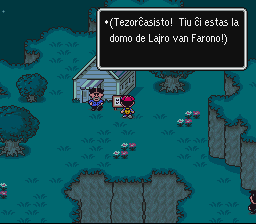
Names are always tough, particularly when they have some joke or deeper meaning. This character, in Japanese, is named Raiyā Hōrando - something like "Liar Holland". Liar is liar, of course, but if the Japanese player doesn't know that much English, it may seem to be a meaningless foreign first name. The last name is not particularly obvious either, but calls to mind 法螺 hora, meaning bragging or big talk. In English, this became Lier X. Agerate, which is perahps more amusing, though much less subtle. I'm pretty happy with what I came up with for an Esperanto rendition: Lajro van Farono. The first name was kept essentially the same, but its effect is more similar to the original Japanese - it seems to probably be some ordinary foreign name, but the player with sufficient English sees "liar". His last name, van Farono, is a fairly clear play on fanfarono (boasting), while at the same time seeming more like a name than Agerate. To ice the cake, van Farono is in the form of a Dutch name, and Lier was originally Mr. Holland. Neat.
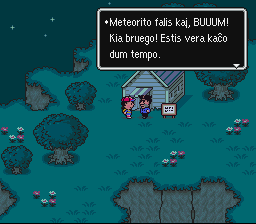
Lier's text was also the first place where I realized how useful it would be to refer to the Japanese script. I struggled with the first line for a while ("Hey Ness, hiya buddy! A meteorite fell down and went boom!"), unsure both of how to render such all that salutation in a language that usually sticks to saluton, how to go boom, and generally how to capture Lier's vivacious talkativeness. When I saw the Japanese line I realized I was focusing much too much on specific words and could allow myself a lot more freedom. There, he says 「やぁ、ネスちゃん。隕石がごーーーーーーーっと、すごい音をたてて落ちてねぇ」 - very roughly, "Yo, Ness-chan. A meteorite fell and booooom - it made a heck of a sound!". So I didn't have to find the best word for buddy - I could have Lier address Ness in any such a way that would suggest the relationship of this older guy calling him Ness-chan. The meteorite didn't have to go boom - but Lier should definitely make the sound that the meteorite made one way or another. Thus, "He Ness, amiketo mia! Meteorito falis kaj, BUUUM! Kia sonego!".
Ness's dad
Let's take a look at Ness's dad's phonecall before you leave the house for your big adventure.
| Mother 2 | EarthBound | Patrino |
|---|---|---|
| もしもし、パパだ。 | Hello, it's your dad. | Ha lo! Estas via paĉjo. |
| 若いときの苦労は買ってでもしろ! | "Work to exhaustion when you're young..." | "Fleksu arbon dum ĝia juneco..." |
| という言葉もあるじゃないか。 | Have you ever heard of a weird saying like this? | Ĉu vi memoras ĉi tian proverbon? |
| パパはいつでもお前の味方だ。 | Just remember, I'm always behind you 100%. Don't be afraid. | Nu, ne forgesu, mi ĉiam subtenas vin, 100%. Ne timu. |
| 怖れずに勇気をもってやってみなさい。 | I know that you're brave. You can do it! | Kion vi pripenas, tio al vi venas. Ĉu ne? |
| [...] | [...] | [...] |
| 健闘を祈る。パパだってヒーロー! | Good Luck, m'boy! I feel like such a hero! | Do, strebu, strebu, je via plena eblo! |
| …の父親になれるなら悪い気はしないぞ。ワハハハ! | What? Well, the father of a hero, at least. Wa ha ha! | Oho! Kia heroego estas mi...a filo! Ha ha ha! |
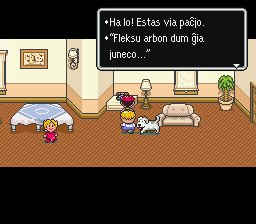
Lots of interesting things to look at here; perhaps foremost, Dad's use of proverbs. In Japanese, the first thing he throws at you after "hello" is a kotowaza. Its meaning is something like "Go out of your way to endure hardships when you're young (and you will reap rest and reward in old age)". EarthBound rendered a translation true to the meaning, but to me, it seemed equally important that Ness's dad was using a proverb - particularly since he comments on this right afterward. Fortunately, Zamenhof furnished his language with a whole massive stack of proverbs. In reality, it's impossible to churn out a thousand proverbs and expect them to enter common usage, and I doubt more than a small handful of them are known to most speakers. But in the world of Patrino, in which Esperanto is universal, there surely will be commonly used proverbs - and where better to draw them from than the Proverbaro? The proverb I chose ("Bend a tree during its youth") doesn't have the same the same meaning as the original Japanese (though arguably neither does the English version), but I couldn't ask for much better than an instruction to apply force during youth for the purpose of an improved future condition. Plus, fleksi calls to mind flexing muscles, and just for extra fun, the character 労 which appears in the word for "hardships" etymologically depicts a flexing, muscular arm.
The other proverb I threw in, "kion vi pripenas, tio al vi venas," was more of an uncalled-for invention, but so was the corresponding line in the English script. In Japanese, dad says something like "Your dad's always on your side. Don't be afraid, gather your courage and give it a go!". So why not just translate that? Well, I liked the English first line better, but didn't care for the second, and wasn't really sure how to say "You can do it!". And if what I was looking for was an idiomatic way to express "you can accomplish what you set your mind to" - why not another proverb? I didn't want to entirely loose the more emphatic sense of "do your best!", though, so toward the end, where the Japanese had 健闘を祈る - something like "(I wish you will) fight bravely!" but also "Good luck!" - I came up with strebu, strebu, je via plena eblo! A bit odd, certainly, but I think it fits with dad's talkativeness and dad-like encouragement.
Finally, dad's quip about being the father of a hero. This one works better in Japanese than I think either English or Esperanto could pull off, since the grammar of Japanese allows dad to have more or less said "Your dad's a hero!" before revealing the full sentence to be more like "Were your dad to become the father of a hero, well that wouldn't be too bad!" The English translation works well in that has dad declaring himself a hero before changing what he wants to say, but it comes off as more of a mistake than I think was intended. Though, given Ness's dad's absent relationship with Ness, it might be perfectly suitable. In any case, I tried to imitate the Japanese somewhat with a long pause before mi turns into mia filo. (In the game, this line doesn't have the ellipse displayed above; the text just pauses scrolling for a second or so midway through mia.) It's more subtle, for better or worse, though I don't like that dad ultimately never refers to himself as the father of a hero. I might take another look at this line. Thoughts?
Buzz Buzz
Buzz Buzz, the mysterious, diminutive messenger from the future. Since Buzz Buzz is pretty much single-handedly the game's exposition, getting his lines right was crucial. Something that didn't quite make it from Japanese to English was Buzz Buzz's peculiar way of talking - a stereotypical "old man" style (think Master Roshi). In English, I never got quite this image of Buzz Buzz - what did come across was wisdom and experience. Unlike most of the game's characters who seem to be chatting off the cuff, Buzz Buzz is speaking carefully and meaningfully. I reasoned that it was more important, then, to convey the wisdom of age than the oldness of age, and I was surprised by how well Esperanto could convey an elevated register, which I effected with more complex verbal constructions and borrowed roots over "native" Esperanto constructions. Here's the scene where Buzz Buzz first emerges from the meteorite:
| Mother 2 | EarthBound | Patrino |
|---|---|---|
| わしはカブト虫、ではない! | A bee I am not... | Abelo mi ne estas... |
| 10年後の未来からやってきたもの、じゃ! | I'm from 10 years in the future. | Mi venas el la estonta jardeko. |
| 未来はもうさんたんたるありさま…じゃ! | And, in the future, all is devastation... | Kaj tiu estonteco jam estas ruino. |
| ギーグという銀河宇宙最大の破壊主が | Giygas, the universal cosmic destroyer, | Gajgas, la universala kosma detruanto |
| 何もかもを地獄の暗闇にたたきこんでしまったのじゃ! | sent all to the horror of eternal darkness... | pelintos ĉiujn kaj ĉion al tenebro infera... |
| ……。しかし、しかしじゃ… | ...... | ...tamen... |
| わしのいる未来に不思議な言い伝えが残っているのじゃ! | However, you must listen! Where I am from, there is a well-known legend that has been handed down from ancient times. | En la epoko el kiu mi venas, ekzistas ankaŭ praa legendo. |
| 「少年がそこにたどり着くならば、正しきものは光を見つける。 | It says "When the chosen boy reaches the point, he will find the light. | Ĝi diras "Se la knabo atingos la lokon, la justa trovos la lumon. |
| 時の流れは悪夢の大岩を砕き、光の道ができる」…と。 | The passing of time will shatter the nightmare rock and will reveal the path of light." | La fluo de tempo frakasos la koŝmaran rokegon malkaŝante la luman irejon." |
| その少年がネス! | You see, it is my opinion that you are that boy, Ness. | Mi forte kredas ke vi, Nes, estas tiu knabo. |
| あんたなのじゃということが、わしのするどい直感でわかったの、じゃ! | This I believe... | ..... |
| ……。ギーグの悪の計画は、もうすでに地球の一部におよんでいるはずじゃ! | Giygas' monstrous plan must have been set in motion somewhere on Earth... | La teruraj planoj de Gajgas certe jam ekdisvolviĝis, ie ĉe la tero... |
| 今すぐに戦いを始めれば間に合うはず、じゃ!! | If you start to confront the enemy immediately, you may have time to counter the evil intentions of Giygas. | Sed, se vi tuj komencas kontraŭbatali la malamikon, eble vi havos tempon por haltigi liajn malicajn intencojn. |
| 大切なのは知恵と勇気、そして仲間たち。…言い伝えでは | Three things are of the utmost importance: wisdom, courage, and friendship. | Tri aferoj plej fundamente gravas: saĝo, kuraĝo, kaj amikeco. |
| 3人の少年と1人の少女がギーグを倒すという。 | ...The legends from the ancient times tell of three boys and a girl who defeat Giygas. | ...La legendo rakontas pri tri knaboj kaj unu knabino kiuj venkas Gajgas. |
| 詳しいことはあとで教える。いくぞ!心配するな。 | ...I will tell you more later. Go now! And do not be anxious about the future. | ...poste mi rakontos al vi pli. Ni iru! Kaj ne maltrankviliĝu pri la estonteco. |
| You have much work to do, Ness. | Vi havas multajn farendaĵojn, Nes. |
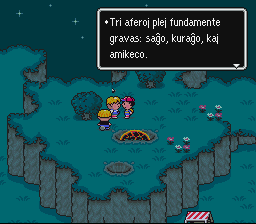
While I generally avoid Esperanto's compound tenses, given their limited use in conversation, if a prophetic warrior-sage discussing events in alternate timelines can't use them effectively I don't know who can. Hence, pelintos - in the future it will the case that Giygas has driven all to darkness. Placing the adjective after the noun in tenebro infera adds to Buzz Buzz's syntactic formality and has, to my ear, a better effect.
Tenebro, and perhaps also koŝmaro, will strike some as unnecessary extra baggage in a language which already gets along perfectly well with mallumo and premsonĝo. Be this as it may, the words exist, and will only leave the language if its speakers stop using them. If they are really unnecessary, they will die. So why do I use them, effectively fighting for their persistence? I value what they offer - a stylistic synonym, the kind of word that helps Gandalf and Gimli stand apart on the page. Speakers want to be able to express nuances of register, to sound casual or refined as fits the occasion, and if Esperanto didn't have the means with which to do so, it would somehow invent them or be the worse off without.
A few notes on the Japanese, from which in several lines here I've drawn more than from the English. Where the English script spoke of "the chosen boy" reaching a place, the Japanese had only 少年 - maybe the boy, maybe any boy - and it was the 正しきもの, or the just / right one, who would find the light. Here, Esperanto's precision worked against me - I wanted ĝusta and justa together, but had to choose. Universala kosma detruanto is a direct calque from the English, in part because it sounds impressive, in part because I'm not sure what to make of the Japanese, which is maybe something like the Most High Lord of Destruction of the Galaxies of the Universe. Lastly, neither my version nor the English managed to work in the Japanese たどり着く, not just to reach, but to "barely manage to reach after a struggle". Just one of those great, flavorful concepts that seems to rarely find a home in a single word.
Lost in Translation
Picky
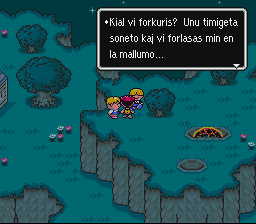
Here I found myself inventing content based on neither of the original scripts, which I'm very wary of. The English lines in question are "Pokey! I've been looking all over for you... You see, Pokey got scared and ran away...". The line never sounded wrong to me, but as I tried to translate it, I thought it flowed somewhat unnaturally, particularly the "You see" transitioning from speaking emotionally to his brother, to giving a factual explanation to Ness, which somehow lessened the amusing impact that it was indeed Pokey to blame for Picky being missing. So, I made this explicit with "Porki! Mi serĉadis vin ĉie... Kial vi forkuris? Unu timigeta soneto kaj vi lasas min en la mallumo...". I like it, I think it's more natural, but it's also nowhere in the source material. Such inventions are sometimes necessary, but I'm not convinced this is such a time.
I was also a bit unsure about rewriting "Geez! Sometimes I wonder which one of us is the real big brother" as "Ve! Iafoje mi dubas, ke vi vere estas la pli aĝa frato." To me, wondering who was really the pli aĝa frato seemed odd, as it sounded to me too literal and objective, unlike "big brother" which is more of a social role. On the other hand, switching "big brother" for "older brother" in the English still seems okay to me, so perhaps writing around wondering who was pli aĝa was unnecessary. In any case, here I think my rendition was close enough.
Others
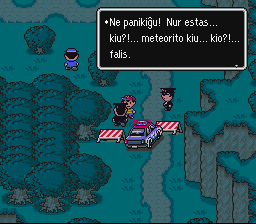
Really wasn't sure what to do with this guy. The English line is "Don't panic! It's just a... what?!... meteorite that... who?!... fell. I just wanna... what?! ...go home...". The Japanese just has him stuttering ("A m-meteorite f-f-fell!"), but also has a nice bit where it sounds like he's going to say "Everyone should hurry back to their homes!" but he actually says "I wanna hurry back home!". (「は、はやく自分のお家にかえ、かえ、かえ、帰りたいよー!」) I couldn't think of a good way to imitate the Japanese, but I also wasn't really sure what's going on in the English. I always thought he was half-asleep. I kind of like it, though, so I just translated it more or less literally.
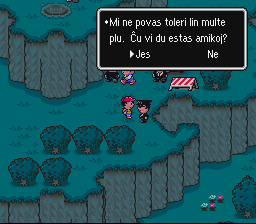
For the most part, I was surprised by how well one can vary their expressions and speak colorfully in Esperanto, particularly without idioms. Every language has figurative speech and metaphor, of course, but Esperanto really does have few to no phrases that mean something unpredictably different from what the words themselves would suggest. Usually this winds up not being a problem - in place of idioms, one has either clever root combinations or simply different words. "Get lost" becomes foriĝu, "let the cat out of the bag" could perhaps be rendered fuŝriveli with no real loss of color. But what to do with "getting on my nerves"? It's not just ĝemas min, yet neither ĝemegas or ĝemaĉas sounded right to me - perhaps because they both sound too blunt and unhumorous. I have seen streĉi la nervojn in use, but on reflection I realized that it really is an oddity - a genuine idiom. A useful one, but perhaps not so useful to be worth encouraging. This line probably won't survive editing, but I'm not sure yet how to best replace it. Perhaps mi ne povas toleri multe plu.
Other notes
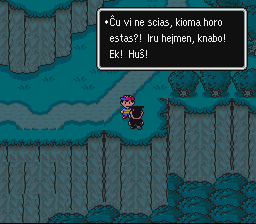
I liked this guy. In English he tells you to "Get yer butt home, pronto!", while in Japanese his language is blunt but not as colorful. I think Ek! Huŝ! ("Go! Shoo!") after telling you to go home was a nice middle ground. I considered replacing knabo with bubo, but it didn't seem necessary.
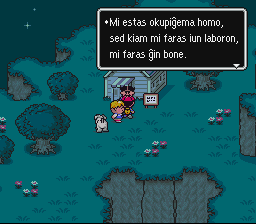
I'm surprised to see that okupiĝema appears neither on any Google-indexed pages nor the entire Tekstaro. This would make me extremely hesitant about using it, but it seems to be both understandable and quite clearly the right word. Lier isn't saying he's a "busy man" as in an okupita homo - that is, he's not saying he's currently busy (though he may be). It seems clear to me that he's saying that he's characteristically busy; that he tends to keep himself busy. As such, okupiĝema seems to perfectly match the sense. But perhaps okupita would be fine after all...
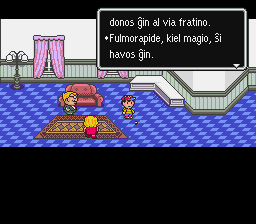 Here was an interesting case where I felt limited by my familiarity with Esperanto. That is, when I saw the line to be translated (in the blink of an eye), I didn't pause to think about it at all - I wanted an idiomatic alternative to "in an instant," and fulmorapide rose to the front of my mind, without me even imagining lightning. While this is generally an encouraging part of the language-learning process, it also worries me somewhat. For me a great appeal of Esperanto is that it is not fossilized. It has much capacity for idiomatic and expressive phrases and comparisons that is yet to be explored, and it is young and its community attentive to language enough that beautiful new expressions can and ought to be taken up like sparks bursting into flames. And yet, for me fulmorapide was already as dead as any centuries-old saying I might use in English. All that said, I am producing a translation, not trying to be an Esperanto Shakespeare. I just hope what I produce demonstrates the possibilities, not the expectations, of the language.
Here was an interesting case where I felt limited by my familiarity with Esperanto. That is, when I saw the line to be translated (in the blink of an eye), I didn't pause to think about it at all - I wanted an idiomatic alternative to "in an instant," and fulmorapide rose to the front of my mind, without me even imagining lightning. While this is generally an encouraging part of the language-learning process, it also worries me somewhat. For me a great appeal of Esperanto is that it is not fossilized. It has much capacity for idiomatic and expressive phrases and comparisons that is yet to be explored, and it is young and its community attentive to language enough that beautiful new expressions can and ought to be taken up like sparks bursting into flames. And yet, for me fulmorapide was already as dead as any centuries-old saying I might use in English. All that said, I am producing a translation, not trying to be an Esperanto Shakespeare. I just hope what I produce demonstrates the possibilities, not the expectations, of the language.
Conclusion
Already so much has happened; already so much translating. After the events of the fated night, Ness has his mission: to search throughout the world to bring together the other chosen ones, and to stand at the 8 spots of the Earth at which he can unite his power with that of the planet itself, thus finding the strength to confront the alien menace Giygas. (But first, he'll want to have some burgers and reform a street gang of shark-attired hooligans.) I've already faced a great variety of challenges, puzzles, and interesting questions of language, which motivate me to push on. However, with such a lion's share of the project still ahead of me, I feel unable to say where I go from here; whether I will face similar challenges at each step or be vexed beyond all expectations. Such is adventure! So onward, until we meet next chapter.
Other images
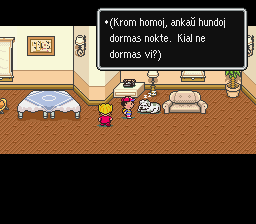 The first line I translated! | 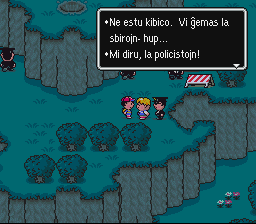 A bit harsher than 'cops', but Pokey's a jerk. |
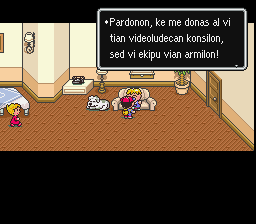 Perhaps the most useful Pokey will ever be. | 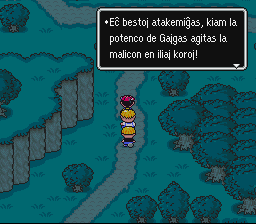 That agglutinative morphology. |
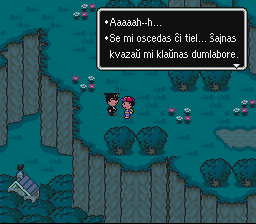 Frankly, I've never found a word in any language as yawny as 'yawn'. | 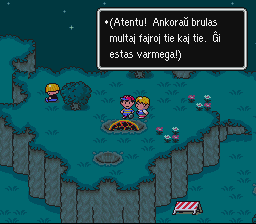 Who's talking, exactly? |